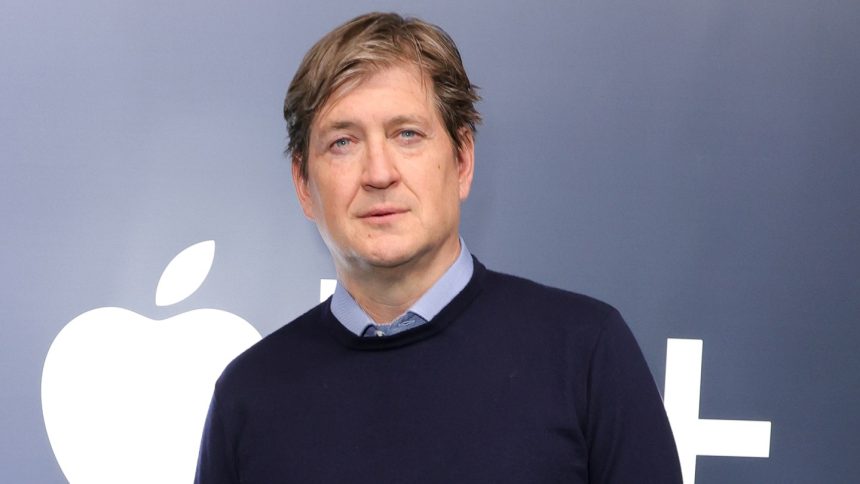‘Shrinking’ Boss Reveals What It’s Like Writing Lines for Harrison Ford
When Bill Lawrence and his Shrinking co-creators were writing the show’s second season, they knew that casting the part of Louis — the drunk driver who killed the wife of Jason Segel’s Jimmy — was going to be extremely difficult. Segel suggested tapping Brett Goldstein, but Lawrence was resistant. “I kept thinking, ‘He’s known as [Ted Lasso’s] Roy Kent, and he’s too gruff,’ ” says the showrunner. He eventually agreed to let Goldstein take on the role on one condition: that he shave his signature facial hair to make the character, a pivotal element of the season-two plotline, more vulnerable. “I called Brett up
and said, ‘If you think you can do this, you should, but if you screw it up, you’re going to ruin the show and it’s going to get canceled,’ ” Lawrence recalls with a laugh. “In the end I thought he just killed it, and I was so proud of him, and now I’m annoyed that his casting wasn’t my idea.”
Shrinking did not get canceled; it received nine Emmy nominations, including its first for outstanding comedy series. Here, the perennially busy showrunner took a break from working on the third season (and the development of the Scrubs reboot, and the fourth season of Ted Lasso, and the development of an upcoming untitled HBO series) to break down what made a difference on their sophomore effort.
Harrison Ford got his first Emmy nomination for this season; do you feel like you learned anything about how to write for him from the first season?
One of the cheat sheets to successful streaming television is, at least for me, working with actors with whom I’ve worked before. Like Jason or my wife [Christa Miller]. We didn’t know Harrison personally, so we originally wrote him as a very serious guy. As he grew to trust us, we realized he was game for anything, and that freed us up to write stuff for him that we normally wouldn’t. I also noticed how vulnerable and emotional he was, that he made stuff sad even when we didn’t put that in the script. Like the Thanksgiving dinner speech in the season-two finale; he could have delivered that matter-of-fact, and it would have worked. We shot everyone’s reactions to him simultaneously, and a lot of those emotional reactions were real. It was a super poignant moment — and I’m a hard, cynical dude, so I got surprised by it.
You Might Also Like
I’m surprised to hear you describe yourself as such.
I mean that in terms of, I don’t really get surprised on TV sets anymore. It’s why I love having young writers around, because they still get that wow factor. I’m the luckiest guy on the planet, and I’m super grateful to get to do this, but one of the things that comes from getting your 10,000 hours in something is you don’t expect to be surprised. When you are, it’s revelatory.
How hard was it, logistically, to pull together that scene — with your entire cast in one room at the same time?
It can be self-indulgent to direct your own show, but one of the reasons I directed that one is I knew I was the only one who was allowed to ask certain things of the cast for that. It was a giant room of thespians, but the whole scene was in service to Harrison’s speech. And it’s a nightmare for a crew to be like, “We’re going to shoot eight pages at one location and there are 17 actors.” But it was worth it.
This season has a lot of guest stars. Do you write your ideal actors into the script?
We’ll often write one draft where the character isn’t too specific, and then we’ll go to Candice Bergen or Damon Wayans — the second they say yes, even before the ink is dry, we’ll do a pass for their voice. But I also wrestle with some of the casting, like maybe I shouldn’t have the guy who played the janitor on Scrubs be on Shrinking, or my wife on Shrinking, or now I have Jamie Tartt from Ted Lasso [Phil Dunster] as one of the male leads on the new Steve Carell show. But also, if you think someone is talented and you like spending time with them, then you would be silly not to keep hiring them.
Did you go through that same process for the character of Louis, played by Brett Goldstein?
No, because once it was Brett, then all the writing was for him. And at the end of the day, he’s going to do that role the way he wants too, since he’s a creator too. I don’t like it when people have a bigger vote than me because I’m a control freak, so that drove me a little insane.
Are you used to writing and showrunning for the cadence of streaming networks by now?
Whether I’m doing 26 episodes of Scrubs or 10 episodes of the Steve Carell show, I have always found a way to be completely behind schedule. I don’t know how I do it. I don’t have the energy of a young writer anymore. They kick me out of the writer’s room in the evenings now — I get grumpy, so they’re like, why don’t you just come back in the morning and see what we did? But one thing I’m going to watch really closely is The Pitt. I’m a huge fan of that show, and I love how quickly they seem to be turning it around. As a fan, I can get bummed out when there’s a huge gap between seasons. We’re starting to shoot the second season of Bad Monkey in a few weeks, and it was such a summer beach read last year, I wish the seasons were closer together.
Shrinking gained a lot of momentum despite the large gap between seasons, do you think there’s a secret to that success?
There are a few things. You gain a toehold into who the actors and actresses are, and the show gets stronger for it. The best example in Shrinking is Michael Urie. By the time the second season was starting, we’d seen him on Broadway in Once Upon a Mattress and the whole world was learning how dynamic he is. So the show got better by us realizing the sort of lines we could give him. I’ve also learned that the shows I like the most have a true beginning, middle and end. We’re planning on doing a fourth season, knock on wood, and we know that if we started that season and Jason Segel’s character was like, I’ve been thinking about it and I’m still really sad about my wife, people would be like wait you already told that exact story. They need to feel like the characters are going on new adventures.
This is truly no shade to The Bear because I still find it compelling, but that’s sort of what is happening with Carmen’s storyline.
I swear, I’m not trying to slam it either! Here’s one of the ways we look at things: We’re rebooting Scrubs, and I don’t get to work on it a ton because I’m at Warner Brothers and it’s a Disney show, but a lot of the original writers and cast got to help out on the pilot. One of the first things Zach Braff said was, I cannot be a 50-year-old doing the same things. I have to be older, I have to be more mature. I remember once during like the eighth season of the original show, a journalist asking Zach how do you think your character has changed since the first year? He goes, I think I have a beard now. Television can’t do that anymore.
Can you tell us anything about the new season of Shrinking?
Right now our biggest goal is just locking it all down and making sure we get to make the show with the same cast. This is a business and these guys are all so good that they have one thousand options. But one of the best things for us is it starts from the top. I was excited to talk to you today specifically, because I saw Apple posted that video of Harrison on his birthday on set. What I’m assuming is going to happen is that we figure it out sooner rather than later and then we’ll get Brett, me and Jason together to go talk to Harrison and the gang and say, here’s the story, I hope you’re up for signing up for it. We hope everyone’s game for doing another one.
Can you envision what the endgame of the show will be?
The way we approach Shrinking is that we know Jason’s character’s journey, which is grief, forgiveness and moving forward. That’s a three-season tale. But if you’re asking me, “What are the next three seasons going to be?” Well, they’re therapists, and just because you’ve gotten over the biggest stick in the spokes of your life doesn’t mean there’s no more pathos. We intentionally put these people in a world that brings all of that to their doorstep, so there’s always more story to tell. We definitely put some Easter eggs into the third season that will allow people to see what’s coming.
This story first appeared in an August stand-alone issue of The Hollywood Reporter magazine. To receive the magazine, click here to subscribe.







